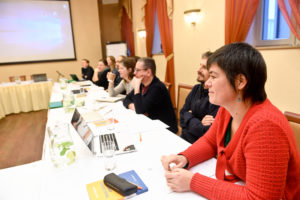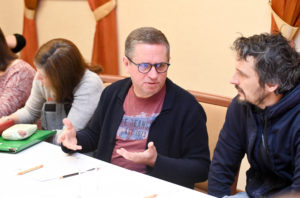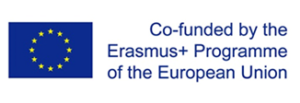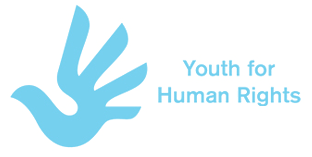Human Rights Education
The aim of the project “Youth for Human Rights” is to foster social inclusion through making use of the full potential of youth work and of human rights education (HRE) in the context of youth work and young people’s non-formal learning. The project is funded by the Erasmus+ programme Key Action 3 and is part of the Consortium of social inclusion projects.
Please find more information about the three Consortium projects in the newsletters Vol 1 (Sep 2017), Vol 2 (Dec 2017), Vol 3 (June 2018), Vol 4 (Dec 2018), and finally, Vol 5 (Sep 2019).
To understand the key activities of the ‘Youth for Human Rights’ project, here is a flyer helping you to see the whole picture.

Why Youth for Human Rights?
The project aims to make sense of already existing abundance of HRE resources and educational concepts/modules, and benefits from the exchange of HRE actors and networks to develop meaningful and efficient educational modules with a multipliers’ effect.
The project timeline is December 2016 till December 2019.
Project partners include: Estonian NA (Leading Partner), German NA, Austrian NA, Belgian/Flemish NA, Slovak NA, Croatian NA, and Latvian NA.
Please find an article providing overview about the project published in the Coyote magazine. Coyote is a magazine about important issues in and around youth work in Europe and beyond, published by the EU-CoE youth partnership once or twice a year.

Project objectives:
• Improving understanding of HRE in the field of youth and supporting young people’s acquisition of social, civic and intercultural competence;
• Supporting youth workers, trainers and other practitioners in the field of youth in using HRE to address issues that directly affect social cohesion, such as inclusion and diversity;
• Improving the quality of youth practice, and of activities undertaken as part of young people’s non-formal learning (such as, volunteering), through networking and capacity-building
Project outcomes:
• Gathering and analysing data about HRE state of play, key actors, concepts and resources in national and international context;
• Adapting and developing HRE related training and education modules: three human rights education training modules for local, regional, national and transnational youth workers and youth leaders, and a compilation of recommendations for human rights education curricula will be developed;
• Capacity building of actors in the youth field on HRE, as well as analysing revelant resources, tools and concepts, as well as offering support to thematic network development:
1. training of trainers
2. training of youth workers
3. training of Erasmus+ NA staff
4. as a supporting activity, carrying through a RAY survey “Competence development and capacity building on HRE in the field of youth”.
- 28 trainers-of-trainers trained on HRE in the field of youth
- 280 youth workers trained on HRE in the field of youth
- 22 Erasmus+ National Agencies staff members are trained on HRE in the field of youth
• Communicating and disseminating project results, and compiling of policy recommendations
During the application phase, the project design looked like this, and during its implementation, like this.

Why we are doing this? 🙂
• The overall vision is that there will be more HRE projects of quality kicked off in the field of youth with the means of Erasmus+, and that youth work in its practice would be more based on HRE than it is today.
• We wish to make the topic of Human Rights an integral part of European youth education and non-formal learning.
• It is crucial to recognize that Erasmus+ NAs need HRE knowledge and understanding, ourselves in order to take a more active role as frontrunners on the topic. The more Erasmus+ NAs understand and make sense their own role in HRE in the context of their work, the better. This way, NAs would be better equipped in supporting the field of youth in implementing HRE in a meaningful manner.
• With the rise of extremists in mainstream political arenas and youth radicalization leading to violence, we find ourselves in a situation where we cannot any longer take for granted the rights we thought have been secured to us long ago.



